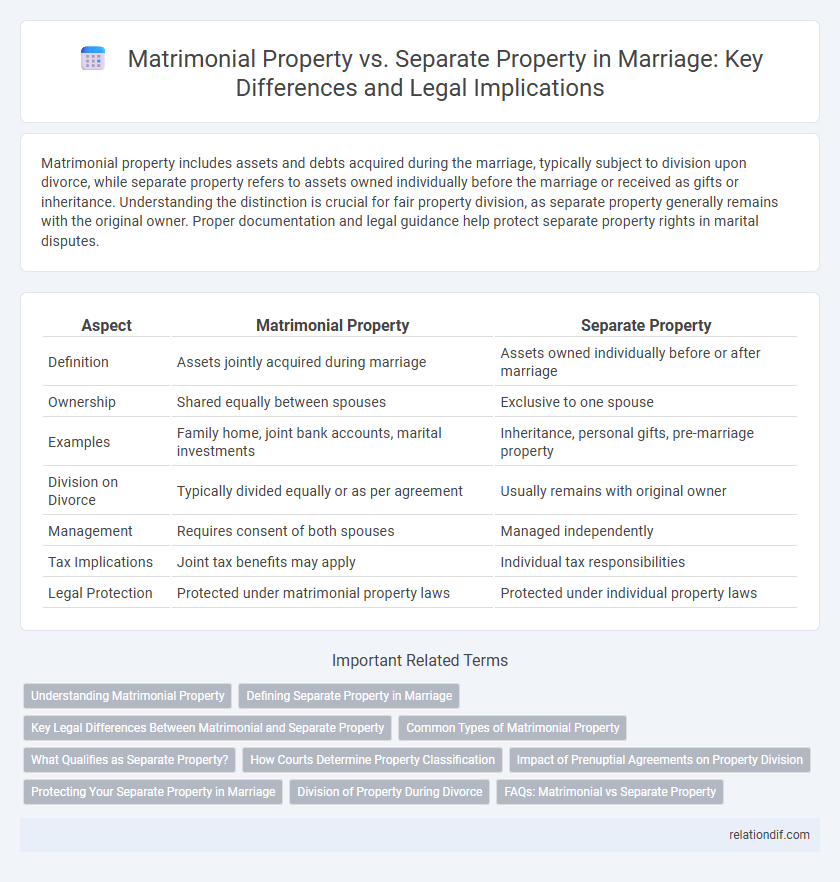Matrimonial property includes assets and debts acquired during the marriage, typically subject to division upon divorce, while separate property refers to assets owned individually before the marriage or received as gifts or inheritance. Understanding the distinction is crucial for fair property division, as separate property generally remains with the original owner. Proper documentation and legal guidance help protect separate property rights in marital disputes.
Table of Comparison
| Aspect | Matrimonial Property | Separate Property |
|---|---|---|
| Definition | Assets jointly acquired during marriage | Assets owned individually before or after marriage |
| Ownership | Shared equally between spouses | Exclusive to one spouse |
| Examples | Family home, joint bank accounts, marital investments | Inheritance, personal gifts, pre-marriage property |
| Division on Divorce | Typically divided equally or as per agreement | Usually remains with original owner |
| Management | Requires consent of both spouses | Managed independently |
| Tax Implications | Joint tax benefits may apply | Individual tax responsibilities |
| Legal Protection | Protected under matrimonial property laws | Protected under individual property laws |
Understanding Matrimonial Property
Matrimonial property refers to assets and debts acquired by either spouse during the marriage, including income, real estate, and investments, subject to division upon divorce or separation. Understanding the distinction between matrimonial property and separate property, which includes assets owned before marriage or received as gifts and inheritances, is crucial for equitable distribution. Courts typically consider factors such as duration of marriage, contributions of each spouse, and agreements when determining the classification and division of matrimonial property.
Defining Separate Property in Marriage
Separate property in marriage refers to assets or income acquired by one spouse before the marriage or through inheritance or gifts specifically designated to that spouse. This property remains exclusively owned by the individual spouse and is not subject to division during divorce or legal separation. Courts distinguish separate property from matrimonial property to ensure fair distribution of marital assets.
Key Legal Differences Between Matrimonial and Separate Property
Matrimonial property refers to assets acquired during the marriage that are subject to division upon divorce, while separate property includes assets owned individually before marriage or received as gifts or inheritance. Key legal differences hinge on the timing of acquisition, with matrimonial property generally considered jointly owned and separate property remaining with the original owner. Understanding these distinctions is crucial for asset division, spousal support, and protecting individual ownership rights in marital dissolution.
Common Types of Matrimonial Property
Common types of matrimonial property typically include assets acquired during the marriage such as real estate, vehicles, joint bank accounts, retirement benefits, and household furnishings. These assets are subject to equitable distribution upon divorce, contrasting with separate property, which usually comprises assets owned before marriage, inheritances, and gifts specifically designated to one spouse. Understanding the distinction between matrimonial and separate property is crucial for fair division in divorce proceedings.
What Qualifies as Separate Property?
Separate property includes assets owned by one spouse before marriage, gifts and inheritances received individually during the marriage, and personal injury settlements awarded solely to one spouse. Property acquired through individual efforts or funds without commingling with marital assets also qualifies as separate property. Courts typically require clear documentation to distinguish separate property from matrimonial property to prevent disputes during divorce proceedings.
How Courts Determine Property Classification
Courts determine property classification by examining whether the asset was acquired before or during the marriage, with separate property typically including assets owned prior to marriage, inheritances, and gifts specifically given to one spouse. Matrimonial property, or marital property, usually encompasses assets earned or acquired jointly during the marriage regardless of title or name on the deed. Factors such as the source of funds, the intent of the parties, and commingling of assets play a critical role in distinguishing separate property from matrimonial property in legal proceedings.
Impact of Prenuptial Agreements on Property Division
Prenuptial agreements significantly influence the division of matrimonial and separate property by clearly defining asset ownership before marriage. These contracts protect each spouse's separate property from being classified as matrimonial property during divorce proceedings, ensuring a predetermined distribution based on the agreement's terms. Courts typically uphold prenuptial agreements if they are fair and executed voluntarily, reducing disputes and fostering clearer property division outcomes.
Protecting Your Separate Property in Marriage
Protecting your separate property in marriage requires clear documentation of assets owned prior to the union, including real estate, investments, and personal belongings. Establishing a prenuptial or postnuptial agreement can legally define and safeguard these assets from being commingled or claimed as matrimonial property. Maintaining detailed records and avoiding joint ownership helps ensure that separate property remains distinct and protected in the event of divorce or legal disputes.
Division of Property During Divorce
Matrimonial property typically includes assets and debts acquired during the marriage, subject to equitable division upon divorce. Separate property, such as assets owned before marriage or received as inheritances, usually remains with the original owner and is excluded from division. Courts analyze factors like commingling and contribution to determine whether property is classified as matrimonial or separate during divorce proceedings.
FAQs: Matrimonial vs Separate Property
Matrimonial property refers to assets acquired during the marriage that are subject to division upon divorce, including income, real estate, and investments obtained jointly. Separate property includes assets owned individually before marriage or received as gifts and inheritances, which typically remain with the original owner. Courts analyze factors such as commingling and the timing of acquisition to determine whether property is matrimonial or separate in divorce proceedings.
Matrimonial Property vs Separate Property Infographic

 relationdif.com
relationdif.com